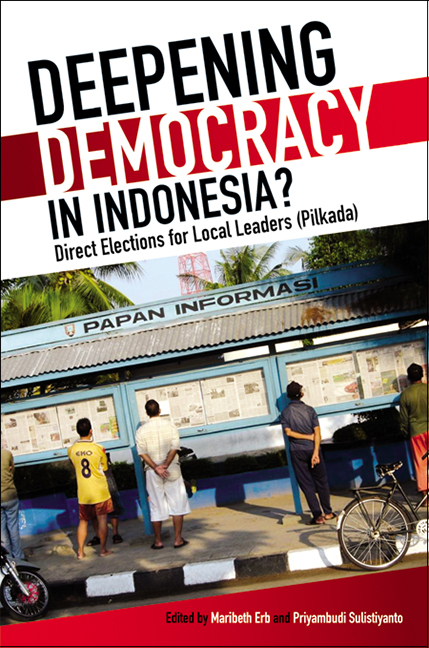Book contents
- Frontmatter
- Dedication
- Contents
- List of Tables
- List of Figures
- Contributors
- Acknowledgements
- Glossary
- 1 Indonesia and the Quest for “Democracy”
- 2 Pilkada Langsung: The First Step on the Long Road to a Dualistic Provincial and District Government
- Part I Political Parties, Politician Elites and the Voters
- Part II Media and Campaigns: Comparing Local and National Elections
- Part III Conflict, Ethnicity, and Political Divisions
- 12 Autonomy, Democracy, and Internal Conflict: The 2006 Gubernatorial Elections in Papua
- 13 Conflict and the Growth of Democracy in Manggarai District
- 14 The Return of the Sultan? Patronage, Power, and Political Machines in “Post”-Conflict North Maluku
- 15 Ethnic Politics and the Rise of the Dayak-Bureaucrats in Local Elections: Pilkada in Six Kabupaten in West Kalimantan
- 16 Bare-Chested Politics in Central Sulawesi: Local Elections in a Post-Conflict Region
- Index
12 - Autonomy, Democracy, and Internal Conflict: The 2006 Gubernatorial Elections in Papua
from Part III - Conflict, Ethnicity, and Political Divisions
Published online by Cambridge University Press: 21 October 2015
- Frontmatter
- Dedication
- Contents
- List of Tables
- List of Figures
- Contributors
- Acknowledgements
- Glossary
- 1 Indonesia and the Quest for “Democracy”
- 2 Pilkada Langsung: The First Step on the Long Road to a Dualistic Provincial and District Government
- Part I Political Parties, Politician Elites and the Voters
- Part II Media and Campaigns: Comparing Local and National Elections
- Part III Conflict, Ethnicity, and Political Divisions
- 12 Autonomy, Democracy, and Internal Conflict: The 2006 Gubernatorial Elections in Papua
- 13 Conflict and the Growth of Democracy in Manggarai District
- 14 The Return of the Sultan? Patronage, Power, and Political Machines in “Post”-Conflict North Maluku
- 15 Ethnic Politics and the Rise of the Dayak-Bureaucrats in Local Elections: Pilkada in Six Kabupaten in West Kalimantan
- 16 Bare-Chested Politics in Central Sulawesi: Local Elections in a Post-Conflict Region
- Index
Summary
The first direct elections of local government chiefs in Indonesia, which began with a wave of 159 polls in June 2005, have highlighted the extraordinary complexity of post-Soeharto politics. The fall of the New Order regime in 1998 triggered an unprecedented process of deregulation and decentralization, ending more than three decades of enforced uniformity under Soeharto's rule. As most restrictions on political organization were gradually lifted during the democratic transition, Indonesia's inherent heterogeneity began to express itself in a myriad of diverse political constellations at the grassroots. The introduction of direct local ballots has marked the culmination of this process, with political coalitions, themes, and arrangements unthinkable at the centre turning into everyday reality in the regions.
Despite very specific local contexts, the majority of pilkada held between 2005 and 2008 nevertheless had distinctly Indonesian features. Most importantly, in nearly all of the areas in which elections were held, the existence of the unitary state of Indonesia formed the unquestioned political framework for the elections and their individual candidates. Instead of attracting votes with populist attacks on the centre, the overwhelming majority of candidates pledged their loyalty to the Indonesian state and its institutional structures. Given the post-1998 centrifugal tendencies in territories like Riau, East Kalimantan, North Sulawesi, Maluku, or Bali, this was not necessarily the most expected outcome.
The direct elections in Papua, however, differed from the national trend in several ways.1 Indonesia's easternmost province conducted the ballot for a new governor within the framework of special autonomy, which had been granted in 2001 to address the grievances held by many Papuans over their place in the unitary state. In contrast to most polls across the archipelago that focused on the internal problems of a particular province, district, or municipality, the elections in Papua took place amid protracted political disputes between Papuan politicians and the central government, particularly over the status of the province of West Irian Jaya. Carved out of Papua by successive Jakartan governments, West Irian Jaya had never been endorsed by the Jayapura-based Papuan elite, leading to a legal and political quagmire that ultimately required two separate elections for governor in March 2006.
- Type
- Chapter
- Information
- Deepening Democracy in Indonesia?Direct Elections for Local Leaders (Pilkada), pp. 259 - 282Publisher: ISEAS–Yusof Ishak InstitutePrint publication year: 2009

